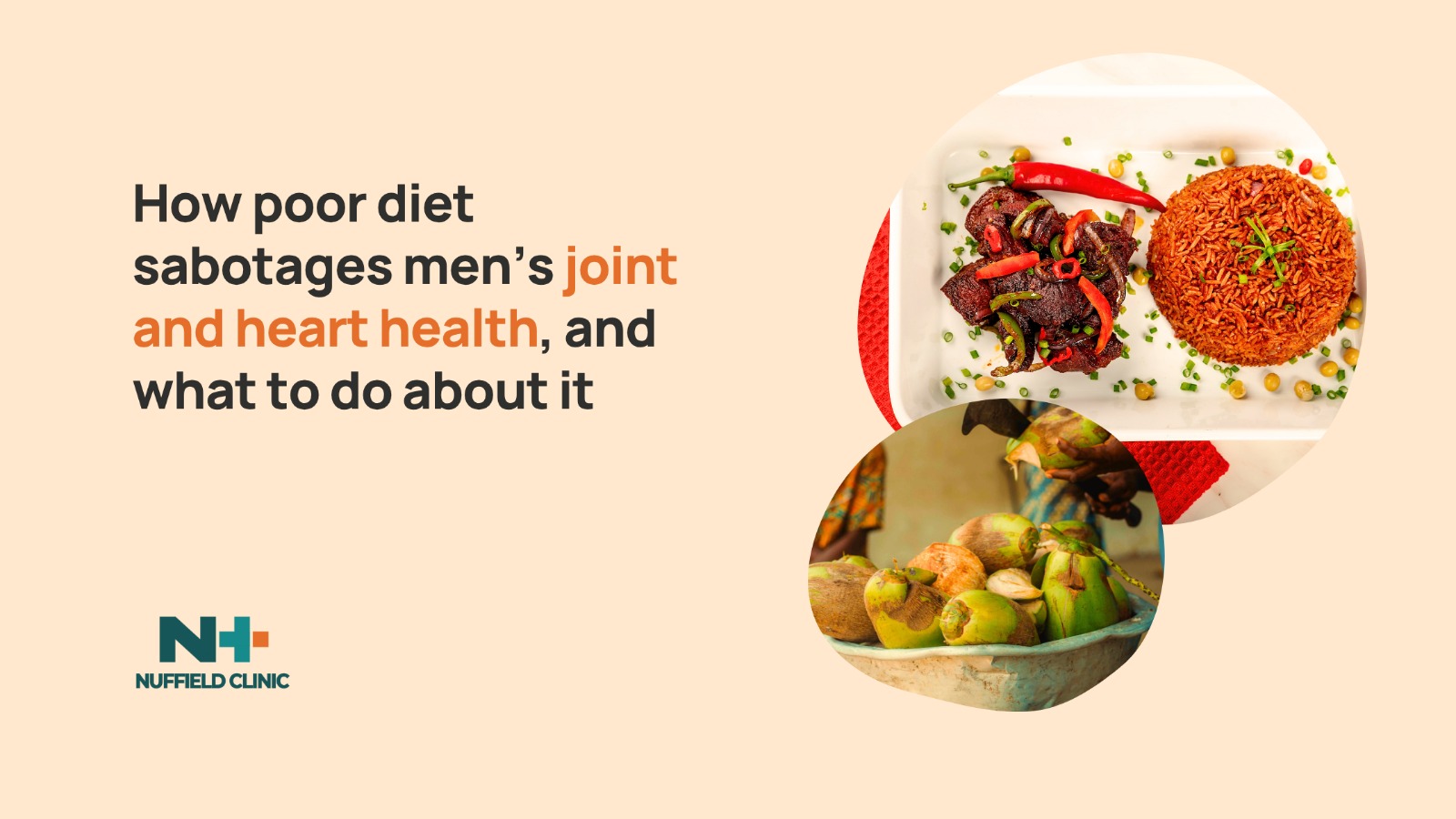How poor diet sabotages men’s joint and heart health, and what to do about it

How does a poor diet sabotage men’s joint and heart health? And what can you do about it? If you’re a man in your 30s, 40s, 50s, or beyond, juggling work, stress, fitness goals, or family life, this article is for you.
Maybe your joints hurt more than they used to. Maybe your cholesterol numbers or blood pressure have crept up. Maybe you’ve been brushing off fatigue, stiffness, or the growing belly with excuses. But here’s what I want you to know: the food you eat every day may be shaping your future, sometimes silently, for better or worse.
In this detailed guide, I explore how poor diet choices fuel both arthritis and heart disease, and how the right foods can help prevent, slow, or even reverse some of the damage. We also introduce the personalised diet and nutrition support offered by Nuffield Clinic, so you don’t have to navigate this journey alone.
Two diseases, one culprit: inflammation
What does joint pain have to do with heart disease? More than you might think.
Inflammation is the link. Poor diet increases systemic inflammation, a chronic, low-grade immune response that damages both joints and blood vessels. Inflammatory forms of arthritis, like rheumatoid arthritis, psoriatic arthritis, ankylosing spondylitis, and gout, flare up in response to pro-inflammatory foods. The same biological processes also stiffen arteries, raise blood pressure, and encourage plaque buildup, hallmarks of cardiovascular disease (CVD).
Let’s be clear: there’s no miracle food to “cure” arthritis or prevent heart attacks. However, a well-structured, balanced diet can dramatically reduce symptoms, improve mobility, and protect your cardiovascular system. The science is solid.
The diet that damages: what men often get wrong
Let’s take a hard look at what’s hurting us:
- Saturated and trans fats (found in fatty meats, butter, fried foods, and pastries) raise LDL cholesterol and inflame arteries.
- Added sugars, especially in soda and processed snacks, contribute to weight gain, insulin resistance, and inflammation.
- Excess sodium, often hidden in packaged foods, raises blood pressure, a key CVD risk.
- Alcohol, especially beer, not only elevates triglycerides and BP but can trigger gout attacks in genetically predisposed men.
These food habits are silent saboteurs. You don’t feel them right away, but they compound year after year. What starts as stiffness or heartburn can end up as arthritic disability or cardiovascular crisis.
What the right diet can do for you
On the flip side, choosing the right foods can dramatically improve how your joints and heart function. Inflammatory markers go down. Blood pressure stabilises. Joint pain eases. Even mental clarity improves.
Here’s how it works:
- Omega-3 fats, found in oily fish (sardines, salmon, mackerel, herring, tuna), linseeds, canola oil, walnuts, and fortified foods, have potent anti-inflammatory effects. They also:
- Lower triglycerides
- Improve blood vessel elasticity
- Reduce blood clot risk
- People with inflammatory arthritis are encouraged to consume at least 2.7g per day of EPA and DHA from fish or supplements. Every man should eat oily fish at least once per week.
- Olive oil, especially extra virgin, is a staple of the Mediterranean diet and rich in anti-inflammatory compounds.
- Fruits and vegetables provide fibre, potassium, and antioxidants, helping to:
- Lower cholesterol
- Reduce joint inflammation
- Support healthy blood pressure
- Aim for at least five portions daily, every colour counts.
- Whole grains and legumes (e.g., oats, lentils, beans, barley, brown rice) lower LDL cholesterol and reduce the risk of heart attacks and stroke. Choose wholegrains over white bread and sugary cereals.
- Nuts and seeds, especially walnuts and almonds, contain monounsaturated fats and micronutrients that help reduce inflammation. Eating 1.5 ounces daily has been linked to a 51% reduction in death from inflammatory diseases.
- Calcium and vitamin D are crucial to prevent bone loss and manage joint health, especially for those on steroids. Include dairy or calcium-fortified plant milks, oily fish, and eggs, and get sunlight exposure, or supplements when needed.
Men and weight: why it matters for joints and heart
Being overweight worsens nearly every marker of joint and heart health. More body weight means more pressure on the knees, hips, and spine. It also increases inflammatory cytokines that damage both joint cartilage and artery walls.
Even a small amount of gradual weight loss improves symptoms of osteoarthritis and lowers blood pressure and cholesterol. But beware of crash diets, they can increase uric acid and trigger gout attacks. Sustainable change is key.
At Nuffield Clinic, we help clients manage their weight through realistic, sustainable nutrition plans. No gimmicks. Just what works.
Condition-specific insights: what men with arthritis or heart issues need to know
- Gout
If you suffer from gout, diet matters immensely. Avoid foods high in purines such as:
- Offal (liver, kidney)
- Shellfish
- Beer
- Sardines, anchovies, mackerel
Stay well hydrated, lose weight gradually, and increase vitamin C intake to reduce attack frequency. Alcohol, especially beer, is a common trigger and should be limited to 1–2 units daily or eliminated.
- Rheumatoid and psoriatic arthritis
Omega-3s are your best friend. Anti-inflammatory diets like the Mediterranean or DASH pattern offer substantial symptom relief. Fasting might give temporary relief, but it’s not safe long-term without professional supervision.
- Osteoarthritis (OA)
Poor diet quality accelerates OA progression. A highly inflammatory diet worsens knee pain and mobility. But a Mediterranean-style diet, rich in anti-inflammatory fats and fibre, slows disease progression and reduces pain.
Which diet plans work best?
The evidence is clear: two eating patterns stand out for men with joint and heart concerns.
The Mediterranean diet
Packed with:
- Whole foods
- Olive oil
- Oily fish
- Pulses, nuts, and fresh produce
It reduces inflammatory markers (CRP, IL-6, TNF-alpha), lowers blood pressure, improves cholesterol, and supports better blood sugar control. It even improves body fat distribution and BMI.
The DASH diet
Originally designed to fight hypertension, it focuses on:
- Fruits, vegetables, and whole grains
- Low-fat dairy
- Minimal added sugar and red meat
It reduces:
- Systolic and diastolic BP
- LDL cholesterol
- hs-CRP (a key inflammatory marker)
- Risk of stroke, CVD, and cancer mortality
What not to overlook
- Hydration: Drink plenty of water, especially for gout. Dehydration increases uric acid levels and can aggravate joint pain and blood pressure.
- Salt: Keep sodium under 6g per day. Read labels. Cook more at home. Avoid overly processed foods.
- Sugar: Cut back added sugars to less than 10% of your daily intake. Ditch soda. Minimise cakes, white bread, and refined snacks.
- Alcohol: Limit or avoid, particularly for gout sufferers or men with high BP or triglycerides. No more than 2 standard drinks a day, and avoid binge drinking entirely.
When food meets medicine
Always review how your diet interacts with your medications. For instance, vitamin K affects blood thinners like warfarin. Some drugs must be taken with food. A registered dietitian can ensure your nutritional plan aligns safely with your prescriptions.
At Nuffield Clinic, our registered nutrition experts work hand-in-hand with our medical and physical therapy teams. You’ll receive a cohesive plan that supports your joints, heart, weight, and energy, without the confusion of conflicting advice.
Reclaim your vitality through food
There’s no shortcut to health, but there is a strategy. Your body reflects your daily habits, especially what you eat. By choosing nutrient-dense foods and avoiding inflammatory triggers, you can improve how your joints move, how your heart pumps, and how you feel every day.
Nuffield Clinic’s diet and nutrition services are built to help men like you thrive, not just survive. We’re here to walk you through the science, build a plan that works for your schedule, and track your progress over time.
Don’t wait for your next check-up to make a change. Book a consultation today, and let food be your first step to freedom.







